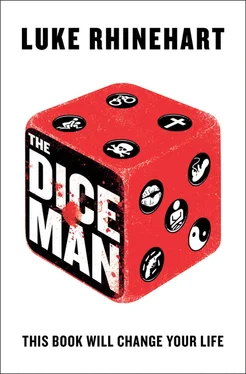The problem was that Jake Ecstein, car-salesman front and all, had written two of the most rational and honest books about psychoanalytic therapy that I’d ever read, and their import essentially demonstrated that none of us knew or had any likelihood of knowing what we were doing. Jake cured patients as well as the next fellow and then published clear, brilliant accounts demonstrating that the key to his success was accident, that frequently it was his failure to follow his own theoretical structure which led to a ‘breakthrough’ and the patient’s improvement. When I ended my early-morning dialogue with Miss Reingold joking that Jake’s reading the 1967 budget record sheets might lead to a breakthrough I was partly serious. Jake had shown again and again the significance of chance in therapeutic development, perhaps best dramatized in his famous ‘pencil-sharpening cure.’
A female patient he’d had under treatment for fifteen months with so little success in changing her neurotic aplomb that even Jake was bored, achieved total and complete transformation when Jake, absentmindedly confusing her with his secretary, ordered her to sharpen his pencils. The patient, a wealthy housewife, went into the outer office to obey and suddenly, when about to insert a pencil into the sharpener, began to shriek, tear her hair and defecate. Three weeks later, ‘Mrs P.’ (Jake’s choice of pseudonyms is only one of his unerring talents) was cured.
I, then, was coming to feel that my elaborate writing efforts were only idle, pretentious playing with words for publication.
I thus spent the hour before lunch: (a) reading the financial section of The New York Times ; (b) writing a page-and-a-half case report of Mr Osterflood in the form of a financial and budget report (‘bearish outlook for prostitutes’; ‘bull market in Harlem playground girls’), and (c) drawing a picture on my book manuscript of an elaborate Victorian house being bombed by motorcycle planes piloted by Hell’s Angels.
I lunched that day with my three closest colleagues: Dr Ecstein, whom I mock because he’s so intelligent and successful; Dr Renata Felloni, the only female Italian-born practicing analyst in recent New York history; and Dr Timothy Mann, the short, fat, disheveled father figure who had psychoanalyzed me four years before and been mentoring me ever since.
When Jake and I arrived, Dr Mann was hunched over the table chewing heavily on a roll and blinking benevolently at Dr Felloni seated opposite him. Dr Mann was a big wheel: one of the directors at Queensborough State Hospital, where I worked twice a week; a member of the executive committee of PANY (Psychiatrists Association of New York) and the author of seventeen articles and three books, one of them the most frequently used text on existentialist therapy in existence. It had been considered an extraordinary honor to be psychoanalyzed by Dr Mann and I had appreciated it greatly until my increasing boredom and unhappiness had deluded me into believing that analysis had done me no good. Dr Mann was concentrating on his eating and may or may not have been listening to the dignified discourse of Dr Felloni.
Renata Felloni resembles a spinsterish dean of women at a Presbyterian all-girls college: she has gray hair always neatly coiffured, spectacles and a slow, dignified, Italian-cum-New England twang that makes her discussions of penises, orgasms, sodomy and fellatio seem like a discussion of credit hours and home economics. Moreover, she had, as far as anyone knew, never been married and, with less certainty, had never in the seven years we had known her given any indication of ever having known a man (biblical ‘know’). Her dignity acted to prevent any of us from either direct or indirect investigations into her past. All we felt free to talk with her about were weather, stocks, penises, orgasms, sodomy and fellatio.
The restaurant was noisy and expensive, and, except for Dr Mann, who loved every trough he had ever fed in, we all hated it and went there because every other restaurant we had tried in the convenient area was also crowded, noisy and expensive. I usually spent so much nervous energy trying to hear what my friends were saying over the clattering of voices, dishes and ‘soft’ music and trying to avoid watching Dr Mann eating that I never remembered whether the food was good or not. At any rate I rarely got sick on it.
‘Only ten percent of our subjects believe that masturbation is “punished by God eternally”,’ Dr Felloni was saying as Jake and I sat down opposite each other at the tiny table. She was apparently talking about a research project she and I were jointly directing, and she smiled formally and equally to her left at Jake and to her right at me, and continued: ‘Thirty-three and a third percent believe that masturbation is “punished by God finitely”; forty percent that it is physically unhealthy; two and one-half percent believe that there is danger of pregnancy, seventy-five per –’
‘Danger of pregnancy?’ Jake broke in as he turned from accepting a menu.
‘We use the same multiple choices,’ she explained smiling, ‘for masturbation, kissing, petting, premarital and postmarital heterosexual intercourse, homosexual petting, and homosexual sodomy. So far, subjects have indicated that there is danger of pregnancy only with masturbation, petting to orgasm, and heterosexual intercourse.’
I smiled to Jake, but he was squinting at Dr Felloni.
‘Well,’ Jake asked her, ‘what’s the question you’re reeling off these percentages for?’
‘We ask, “For what reasons, if any, do you believe that sexually exciting yourself through fantasy, reading, looking at pictures or manual excitation is bad?”’
‘Do you give them a choice of reasons for why masturbation is good?’ Dr Mann asked, wiping his lower lip with a piece of roll.
‘Certainly,’ Dr Felloni replied. ‘A subject can answer that he approves of masturbation for any of six options: (1) It is enjoyable; (2) it releases tension; (3) it is a natural way of expressing love; (4) it is something one should experience to be complete; (5) it procreates the race; (6) it is the social thing to do.’
Jake and I now began laughing. When we quieted she assured Jake that only the first two choices had been chosen for masturbation, except for one person who had indicated that masturbation was valuable as a way of expressing love. She had determined in a recent interview, however, that the subject had checked that item in a cynical frame of mind.
‘I don’t know why you ever got involved in this thing,’ Jake said, turning to me suddenly. ‘Social psychologists have been turning out studies like yours for decades. You’re digging in sterile ground.’
Dr Felloni nodded politely at Jake’s words as she did whenever someone was uttering anything which might vaguely be construed as criticism of her or her work. The more vigorous and direct the criticism the more vigorously she nodded her head. It was my hypothesis that were a prosecuting attorney ever to attack her for a full hour there would be no need for a guillotine: her neck would have melted away, and her head, still nodding, would be rolling on the floor at the prosecutor’s feet. She replied to Jake:
‘Our plan to evaluate the validity of the multiple choice answers by in-depth interviews of every subject is, however, a genuine contribution.’
‘You’ll spend – my God – a hundred and twenty hours verifying the obvious: namely, multiple-choice attitude tests are unreliable.’
‘Yes, but remember we got a foundation grant,’ I said.
‘So what? Why didn’t you request it for something original, something worthwhile?’
‘We wanted a foundation grant,’ I answered ironically.
Читать дальше












